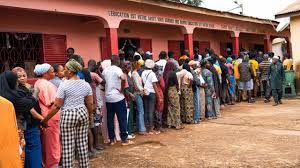
Guinea has recorded an exceptionally high turnout of 91% in its constitutional referendum, held on September 21, signaling a pivotal moment in the country’s political landscape.
Partial results indicate a strong victory for the “yes” vote, reflecting widespread support for a new legal framework while also highlighting the uncertainties surrounding Guinea’s future governance.
According to Djénabou Touré, Director General of Elections, 19,454 polling stations—more than 80% of the total 23,662—had been counted. Early figures show that approximately 4.8 million Guineans cast ballots, with over 80% supporting the adoption of the new constitution. The Supreme Court is expected to announce final results in the coming days.
The referendum occurred in a tense political environment. Opposition parties had called for a boycott, accusing the ruling junta of attempting to extend its grip on power. Despite these appeals, citizens turned out in large numbers, balancing desires to move beyond four years of military rule under Colonel Mamadi Doumbouya with ongoing support for his leadership. The vote was conducted peacefully under the oversight of 45,000 security personnel, ensuring orderly participation across the country.
Since leading the 2021 coup that ousted former President Alpha Condé, Colonel Doumbouya has governed Guinea with firm control. The constitutional referendum represents a critical step in the transition, paving the way for forthcoming presidential and legislative elections scheduled before the end of 2025. Authorities describe these elections as essential to restoring constitutional order and meeting both domestic expectations and international pressure for democratic governance.
For many Guineans, the approval of the new constitution brings hope for stability and the eventual return to civilian rule. Others caution that the vote may primarily serve to legitimize the junta leader’s potential candidacy, enabling Colonel Doumbouya to run for the presidency under the new legal framework.
As Guinea moves into the next electoral phase, the high voter engagement underscores both the population’s desire for political change and the delicate balance between hope for democratic restoration and concerns over continued military influence.



